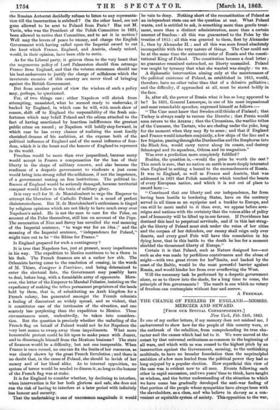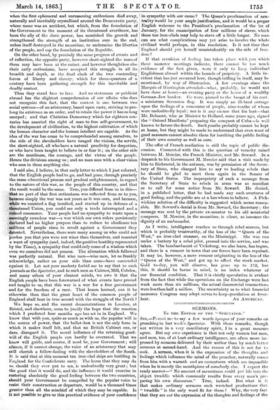THE CHANGE OF FEELING IN ENGLAND.—MESSRS. MERCIER AND SEWARD.
[FROM OUR SPECIAL CORRESPONDENT.]
New York, Feb. 24th, 1863. IN one of my earlier letters, if my memory does not mislead me, I endeavoured to show how far the people of this country were, at the outbreak of the rebellion, from comprehending its true cha- racter and the causes which had led to it. We were moved at the outset by that universal enthusiasm so common in the beginning of all wars, and which with us was roused to the highest pitch by an insurrection against the Government, seeming, to the unthinking multitude, to have no broader foundation than the unprincipled ambition of a few men hurled from the political power they had so long enjoyed by a popular election. How superficial this view of the case was is evident now to all men. Events following each other in rapid succession, and two years' time to think, have taught us wisdom, and the better understanding of the situation to which we have come has gradually developed the anti-war feeling of that portion of the people whose sympathies have always been with the slaveholders, as a class, and who believe in slavery as a con- venient or equitable system of society. This opposition to the war,
when the first ephemeral and unreasoning enthusiasm died away, naturally and inevitably crystallized around the Democratic party, whose name was an accident, but which, from the foundation of the Government to the moment of its threatened overthrow, has been the ally of the slave power, has nourished the growth and strengthened the strength of an institution sure in the end, unless itself destroyed in the meantime, to undermine the liberties of the people, and sap the foundation of the Republic.
On the other hand, by precisely the same progress of events and of reflection, the opposite party, however short-sighted the mass of them may have been at the outset, and however thoughtless also their early enthusiasm, have accepted this struggle in all its breadth and depth, as the final clash of the two contending forces of liberty and slavery, which for three-quarters of a century have been gathering strength for this inevitable and deadly contest.
Thus they stand face to face. And no statesman or publicist abroad has the slightest comprehension of our affairs who does not recognize this fact, that the contest is one between two social systems—of an aristocracy, based upon caste, striving to pro- long its existence as an order, and to retain the power it has so long usurped ; and that Christian Democracy which for eighteen cen- turies has asserted the right of man to free self-government, to the development of civilization, to the highest cultivation of which the human character and the human intellect are capable. As the idea of the war has come to be comprehended among ourselves, to the side of the slaveholders have ranged the vicious, the servile, the short-sighted, all who have a natural proclivity for despotism, or who have been taught to believe in or fear it ; on the other side are the manliness, the courage, and the virtue of the people. Hence the divisions among us ; and no man sees with a clear vision who sees in them anything else.
I said also, I believe, in that early letter to which I just referred, that the English people had to go, and had gone, through precisely the same educational process and gradual enlightenment, in regard to the nature of this war, as the people of this country, and that the result would be the same. True, you differed from us in this— that no part of that first enthusiasm was reflected from us to you, because simply the war was not yours as it was ours, and because, while we resented a flag insulted, and started up in defence of a threatened Union, you could see only a trade interrupted and a ruined commerce. Your people had no sympathy to waste upon a seemingly causeless war—a war which our own rulers persistently declared had no higher purpose than to reduce to obedience ten millions of people risen in revolt against a Government they detested. Nevertheless, there were many among us who could not ptrdon you that you were not wiser than themselves, and resented a want of sympathy (and, indeed, the positive hostility represented by the Times), a sympathy that could only come of a wisdom which even we ourselves did not possess. The alienation which followed was perfectly natural. But wise men—wise men, let us frankly acknowledge, rather on your side than ours—have contended against it. Let not your modesty forbid me to say that to such journals as the Spectator, and to such men as Cairn, Mill, Cobden, and many others of your clearest minds, we owe it that the English people have been forewarned of what events have proved and taught to us, that this war is a war for a free government and for the freedom of a race. That lesson learned, can it be otherwise than that the great heart of the common people of England shall beat in true accord with the struggle of the North ?
We hope so, and the recent demonstrations in London, at Bristol, and elsewhere, seem to justify the hope that the reaction which I predicted four months ago has set in in England. We know that with you, quite as much as with us, the popular will is the source of power, that the ballot-box is not the only form in which it makes itself felt, and that no British Cabinet can, or dare, disregard it. The moral influence of the returning good- will of the English people can hardly be overrated. That we know will guide, and coerce, if need be, your Government ; will silence, if it cannot change, the voice of an aristocracy that may still cherish a fellow-feeling with the slaveholders of the South. It is said that at this moment ten iron-clad ships are building in England for the Confederate navy. The harm that they may do us, should they ever put to sea, is undoubtedly very great ; but the good that it would do, and the influence it would exercise in restoring absolutely the good feeling between the two countries, should your Government be compelled by the popular voice to resist their construction or departure, would be a thousand times greater than all the mischief of which they may be capable. Is it not poodble to give us this practical evidence of your confidence in sympathy with our cause? The Queen's proclamation of neu- trality would be your ample justification, and it would be a proper English welcome to the President's proclamation of the 1st of January, for the emancipation of four millions of slaves, which these ten iron-clads may help to stave off a little longer. No man can see what complications may yet arise to involve the whole civilized world perhaps, in this resolution. Is it not time that England should put herself unmistakeably on the side of free- dom?
If that revulsion of feeling has taken place with you which these monster meetings indicate, there cannot be too much evidence of the fact given, were it only to keep individual Englishmen abroad within the bounds of propriety. A little in- cident that has just occurred here, though trifling in itself, may be mentioned, by way of illustration. A few evenings since the Marquis of Hartington attended—what, probably, he would not have done at home—an evening party at the house of a wealthy German-Jew banker. lie wore, pinned to the breast of his coat, a miniature Secession flag. It was simply an ill-bred outrage upon the feelings of a concourse of people, nine-tenths of whom were undoubtedly loyal ; nor is it any excuse that his host—that Mr. Belmont, who as Minister to Holland, some years ago, signed the "Ostend Manifesto" proposing the conquest of Cuba—is well known to favour the South. Such youths probably cannot be kept at home, but they might be made to understand that even want of good manners cannot absolve them for insulting the public feeling of their own country as well as ours.
The offer of French mediation is still the topic of public dis- cussion. Connected with this is the question of veracity raised between M. M ercier, the French Minister, and Mr. Seward. In a despatch to his Government M. Mercier said that a visit made by him to Richmond, in the autumn, was by permission of the Secre- tary of State, who charged him to say to leading rebels that he should be glad to meet them again in the Senate of the United States. The impropriety of such a message from the Secretary of State to rebels in arms was so manifest as to call for some notice from Mr. Seward. He denied, in a published letter, that he had made any such overtures of good feeling, and the public are at a loss whom to believe. A Pick- wickian solution of the difficulty is suggested which seems reason- able. Mr. Seward's denial is from Mr. Seward, the Secretary ; the message was sent by the private ex-senator to his old senatorial compeers. M. Mercier, in the meantime, is silent, as becomes the dignity of an ambassador.
As I write, intelligence reaches us through rebel sources, but which is probably trustworthy, of the loss of the "Queen of the West," an iron-clad steamer, on the Mississippi. She was run under a battery by a rebel pilot, pressed into the service, and was taken. The bombardment of Vicksburg, we also learn, has begun, and there is a rumour in town that our forces have been repulsed. It may be, however, a mere rumour originating in the loss of the "Queen of the West," and got up to affect the stock market. Gold to-day, you will observe, has gone up to 172, but this, it should be borne in mind, is no index whatever of our financial condition. That it is chiefly speculative is evident from the fact that while the operations on the Exchange were last week more than six millions, the actual commercial transactions were lessthan half a million. The uncertainty as to what financial measures Congress may adopt serves to keep speculation at fever-































 Previous page
Previous page